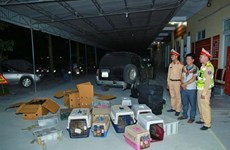Vietnam strives to eliminate persistent organic pollutants
Vietnam will stop using all types of machinery and equipment containing
poluchlorinated biphenyl (PCB), one of the persistent organic
pollutants (POPs), by 2020 and safely dispose the substance by 2028.
Vietnam will stop using all types of machinery and equipment containing
poluchlorinated biphenyl (PCB), one of the persistent organic
pollutants (POPs), by 2020 and safely dispose the substance by 2028.
The target has been set under a national plan aiming to realise the contents of the Stockholm Convention – a global treaty to protect human and the environment from the threats of POPs, to which Vietnam herself is one of the first 14 signatory parties.
Supporting the country’s endevours, the Ministry of Natural Resources and Environment in 2009 approved a PCB management project funded by the Global Environment Fund (GEF) via the World Bank, according to Tran The Loan, deputy head of the Pollution Control Department under the Environment General Department
Being carried out nationwide between 2010 and 2014 with the GEF’s non-refundable aid of 7 million USD and the Vietnamese Government’s corresponding capital of 10 million USD, the project aims to complete a legal framework and raise public knowledge of the toxic chemicals to mitigate their risks at the lowest level.
Through the United Nations Development Programme, the GEF has continued aiding a project to update Vietnam’s implementation plan for the Convention between 2014 and 2015, with a view to realising the country’s obligations to the agreement.
Vietnam signed the Stockholm Convention in 2002, which targets the management and elimination of 23 dangerous groups of chemicals.
Vietnam did not produce PCB but imported electrical equipment using PCB in the past. From 1960 and 1990, the country purchased at least 27,000 tonnes of oil containing the substance. However, being aware of the danger and toxicity of this chemical, Vietnam has been doing her utmost to realise the aforesaid resolution.
Globally, many countries have stopped producing PCB. However, a mere 4 percent of the substance has been decomposed, while 31 percent remains existent in the mainland and coast areas.-VNA
The target has been set under a national plan aiming to realise the contents of the Stockholm Convention – a global treaty to protect human and the environment from the threats of POPs, to which Vietnam herself is one of the first 14 signatory parties.
Supporting the country’s endevours, the Ministry of Natural Resources and Environment in 2009 approved a PCB management project funded by the Global Environment Fund (GEF) via the World Bank, according to Tran The Loan, deputy head of the Pollution Control Department under the Environment General Department
Being carried out nationwide between 2010 and 2014 with the GEF’s non-refundable aid of 7 million USD and the Vietnamese Government’s corresponding capital of 10 million USD, the project aims to complete a legal framework and raise public knowledge of the toxic chemicals to mitigate their risks at the lowest level.
Through the United Nations Development Programme, the GEF has continued aiding a project to update Vietnam’s implementation plan for the Convention between 2014 and 2015, with a view to realising the country’s obligations to the agreement.
Vietnam signed the Stockholm Convention in 2002, which targets the management and elimination of 23 dangerous groups of chemicals.
Vietnam did not produce PCB but imported electrical equipment using PCB in the past. From 1960 and 1990, the country purchased at least 27,000 tonnes of oil containing the substance. However, being aware of the danger and toxicity of this chemical, Vietnam has been doing her utmost to realise the aforesaid resolution.
Globally, many countries have stopped producing PCB. However, a mere 4 percent of the substance has been decomposed, while 31 percent remains existent in the mainland and coast areas.-VNA













